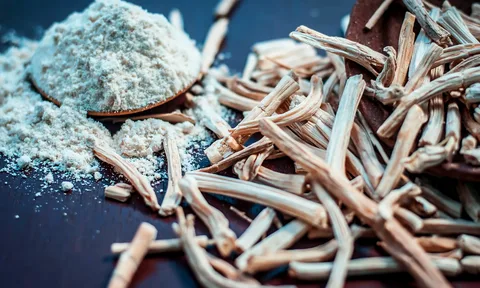Introduction to Shatavari
Shatavari is a perennial climbing plant native to India, Sri Lanka, and the Himalayas. It belongs to the Asparagus genus and is closely related to common asparagus, but it is the roots of Shatavari that are primarily used for medicinal purposes. The name “Shatavari” translates to “she who possesses a hundred husbands” in Sanskrit, reflecting its traditional use as a tonic for female reproductive health.
Nutritional Profile of Shatavari
Shatavari contains various nutrients and bioactive compounds that contribute to its health-promoting properties. While its exact nutritional composition may vary depending on factors such as growing conditions and preparation methods, Shatavari is known to contain:
Saponins
These phytochemical compounds have antioxidant and immune-modulating effects and are believed to contribute to many of Shatavari’s health benefits.
Flavonoids
Flavonoids are plant compounds with antioxidant and anti-inflammatory properties that may help protect against chronic diseases and support overall health.
Essential Minerals
Shatavari contains essential minerals such as calcium, magnesium, and potassium, which are important for bone health, muscle function, and overall well-being.
Dietary Fiber
Shatavari is a good source of dietary fiber, which supports digestive health and may help regulate blood sugar levels and cholesterol levels.
Health Benefits of Shatavari
Shatavari is revered in Ayurvedic medicine for its numerous health benefits. Some of the potential benefits of Shatavari include:
Female Reproductive Health
Shatavari is traditionally used to support female reproductive health and hormonal balance. It is believed to regulate menstrual cycles, relieve menstrual cramps, and alleviate symptoms of menopause.
Fertility Support
Shatavari is often recommended as a natural remedy to enhance fertility in both men and women. It is believed to improve reproductive health by supporting the functioning of the reproductive organs and balancing hormone levels.
Adaptogenic Properties
Shatavari is classified as an adaptogen, meaning it helps the body adapt to stress and maintain homeostasis. It is believed to have a calming effect on the nervous system and may help reduce anxiety and stress levels.
Digestive Health
Shatavari is used to support digestive health and relieve gastrointestinal discomfort. It has mild laxative properties and may help alleviate symptoms of indigestion, bloating, and constipation.
Immune Support
Shatavari is rich in antioxidants and immune-modulating compounds that support overall immune function and help protect against infections and diseases.
Anti-inflammatory Effects
Shatavari contains anti-inflammatory compounds that may help reduce inflammation in the body and alleviate symptoms of inflammatory conditions such as arthritis and asthma.
Antioxidant Properties
Shatavari is rich in antioxidants, which help neutralize free radicals and protect against oxidative stress and cellular damage.
Potential Side Effects and Precautions
While Shatavari is generally considered safe for most people when taken in recommended doses, it may cause side effects or interactions in some individuals. Potential side effects of Shatavari may include:
Gastrointestinal Upset
Some people may experience gastrointestinal discomfort, such as bloating, gas, or diarrhea, especially when taking high doses of Shatavari.
Allergic Reactions
Allergic reactions to Shatavari are rare but possible. If you experience symptoms such as itching, rash, or difficulty breathing after taking Shatavari, discontinue use and seek medical attention.
Hormonal Effects
Shatavari may have hormonal effects and should be used with caution in individuals with hormone-sensitive conditions such as breast cancer, ovarian cancer, or uterine fibroids.
Drug Interactions
Shatavari may interact with certain medications, including hormone therapies, immunosuppressants, and medications that affect blood sugar levels. If you are taking any medications, consult with your healthcare provider before using Shatavari.
Forms and Dosage of Shatavari
Shatavari is available in various forms, including powder, capsules, tablets, liquid extracts, and teas. The appropriate dosage of Shatavari may vary depending on factors such as age, health status, and the form of the supplement. It is generally recommended to follow the dosage instructions provided on the product label or consult with a qualified healthcare professional for personalized guidance.
How to Incorporate Shatavari into Your Routine
There are several ways to incorporate Shatavari into your daily routine to enjoy its potential health benefits:
Supplements
Take Shatavari supplements in the form of capsules, tablets, or liquid extracts as directed by the manufacturer or healthcare provider.
Tea
Brew Shatavari tea by steeping Shatavari root powder or dried root slices in hot water for 5-10 minutes. Strain and drink the tea for a soothing and therapeutic beverage.
Powder
Add Shatavari powder to smoothies, juices, or herbal teas for a convenient way to enjoy its benefits. Start with a small amount and gradually increase as desired.
Frequently Asked Questions (FAQs)
What is Shatavari used for?
Shatavari is traditionally used in Ayurvedic medicine to support female reproductive health, enhance fertility, promote hormonal balance, and support overall well-being. It is also valued for its adaptogenic and rejuvenating properties.
Can men take Shatavari?
While Shatavari is often associated with women’s health, it can be beneficial for men as well. It may help support reproductive health, improve fertility, and promote overall vitality and well-being.
Is Shatavari safe during pregnancy and breastfeeding?
Pregnant and breastfeeding women should consult with a healthcare provider before using Shatavari or any herbal supplement. While Shatavari is traditionally used to support reproductive health, its safety during pregnancy and breastfeeding has not been extensively studied.
How long does it take for Shatavari to work?
The time it takes to experience the benefits of Shatavari may vary depending on individual factors such as dosage, health status, and the form of the supplement. Some people may notice improvements in symptoms within a few days to weeks of consistent use.
Can Shatavari help with menopause symptoms?
Shatavari is often used to alleviate symptoms of menopause, such as hot flashes, night sweats, mood swings, and vaginal dryness. It is believed to support hormonal balance and promote overall well-being during the menopausal transition.
Can I take Shatavari with other herbs or supplements?
Shatavari is generally safe to take with other herbs or supplements, but it may interact with certain medications or herbs. If you are taking any medications or have underlying health conditions, consult with a healthcare provider before combining Shatavari with other supplements.
How should I store Shatavari supplements?
Store Shatavari supplements in a cool, dry place away from direct sunlight and moisture. Follow the storage instructions provided on the product label to ensure the potency and efficacy of the supplements.
Conclusion
Shatavari is a versatile herb with a long history of use in traditional medicine for its numerous health benefits. From supporting reproductive health and fertility to promoting overall well-being and vitality, Shatavari offers a range of potential advantages for both men and women. While generally safe for most people when used as directed, it’s essential to be aware of potential side effects, precautions, and interactions before incorporating Shatavari into your routine. Whether you choose to take Shatavari supplements, brew Shatavari tea, or add Shatavari powder to your favorite recipes, this herb has much to offer for those seeking natural health and wellness solutions. As always, consult with a healthcare provider or qualified herbalist for personalized guidance and recommendations based on your individual needs and health goals.
- 10 Impressive Benefits of White Tea - April 24, 2024
- How Many Hours of Sleep Do You Really Need? - April 24, 2024
- Can My Dog Eat This? A List of Human Foods Dogs Can and Can’t Eat - April 24, 2024


